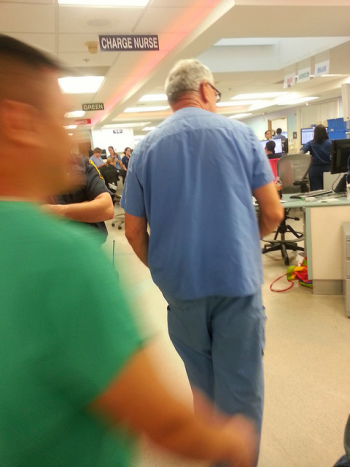Being your own healthcare advocate
There’s nothing like a trip to the emergency room to drive home the importance of being your own healthcare advocate.
My work as a writer revolves around helping consumers engage in their own healthcare, from buying insurance to navigating the healthcare system to living well. As a woman living with diabetes, I’m also an advocate for my own good health. I practice what I preach.
 But a recent visit to the ER was a powerful reminder that we must always be vigilant about our own healthcare. Should we trust the medical experts? Absolutely. And as patients, we’re experts about ourselves — or should be — and have a responsibility to be engaged in healthcare decision-making.
But a recent visit to the ER was a powerful reminder that we must always be vigilant about our own healthcare. Should we trust the medical experts? Absolutely. And as patients, we’re experts about ourselves — or should be — and have a responsibility to be engaged in healthcare decision-making.
I was treated at one of the country’s best hospitals, after having symptoms of what could be a heart attack: pounding heart, nausea, sweating and dizziness.
The hospital ran tests and kept me for 15 hours to monitor my heart. As it turns out, my heart is perfect. The culprit? Dehydration — probably caused by the overly long walk I’d taken earlier in the day and a diuretic I’d been prescribed — and a mild urinary tract infection.
All’s well that ends well. However, I was reminded that you can never take things for granted. The woman in the next bed told me I was “breaking new ground” by asking a lot of questions. Asking questions shouldn’t be innovative. It should be routine — but it isn’t, because many people just don’t know they can and should do it.
I was writing this post in my head while I was still in the ER, thinking that my experience might help educate others. Here are a few tips.
If you have a chronic health condition, always carry your medications with you.
I’m glad I had the presence of mind to bring my insulin with me. The hospital wanted to adjust my regimen to their convenience, but I insisted they let me stick to what’s been proven to work. To their credit, they listened.
Always carry a list of current medications, including vitamins and supplements.
Apparently this is not the norm. When I told the cardiologist that I had a list of current meds in my purse, she looked genuinely surprised. I can’t remember the exact medication names and dosages, so being able to hand medical staff that information reduces the chance of mistakes. Heaven forbid I’d been unconscious, they would have found the list, along with other health information and emergency phone numbers, in my purse. They’d know to look because I wear a medical alert bracelet.
Know your medical history — and share it.
My symptoms mirrored those of a heart attack in women, so I told the staff I have a family history of heart disease, and a personal history of high blood pressure and diabetes. Maybe they would have asked me, but it never hurts to be proactive. In retrospect, I’m going to add key family history facts to the sheet I carry with information on my medications and health conditions, including allergies. I also learned that in an emergency, it isn’t always easy to know what to tell the medical team. It took me an hour to realize I should have told them I’d been nauseous on and off for a few days. In a medical situation, there’s no such thing as too much information.
Don’t be afraid to say “no” when appropriate.
I have food allergies and eat a very specific diet that keeps my diabetes in good control. The “diabetic” and “heart-healthy” menu options at the hospital didn’t give me much to choose from. I had to explain my dietary needs multiple times to the nurses, nutritionists and food service staff. Finally, they okayed my food request: fresh fruit and a hard-boiled egg. (I stopped short of saying that one hard-boiled egg was not going to give me a heart attack.) Again, the hospital finally listened but it wasn’t to anyone’s benefit to make it so difficult.
Ask the staff to explain things you don’t understand.
As I started feeling better, the staff repeatedly told me it was a good sign that I was no longer “diaphoretic.” I write about healthcare and I even had to look up the word. Why didn’t they just say “sweating heavily”? When health professionals don’t put things in plain English, insist on explanations.
Question anything that just doesn’t seem right.
At the end of my stay, the hospital tried to send me home with someone else’s discharge instructions. I figured it out because the nurse said I should keep taking a medication I know is for a thyroid condition I don’t have. When I said so, she replied, “Oh, there are lots of different names for medications.” I told her I did not take any thyroid medications. That’s when she realized she had the wrong Smith. She was profusely apologetic, but if I hadn’t known better I would have gone home not knowing how to take my antibiotic or make the other adjustments recommended to prevent another episode of dehydration.
 I give the hospital kudos for providing detailed discharge instructions once I got the right ones. They called the next day to make sure I carried through on my follow-up care. And when I asked questions or advocated for myself, they listened to me — the patient. Overall, I got great care.
I give the hospital kudos for providing detailed discharge instructions once I got the right ones. They called the next day to make sure I carried through on my follow-up care. And when I asked questions or advocated for myself, they listened to me — the patient. Overall, I got great care.
But I can’t help but wonder: What would have happened if I hadn’t asked questions? What if I hadn’t known how to provide the information they needed or ask the questions that kept me safe? What if I were someone who simply trusted them to do whatever they felt was best, even though they’d never set eyes on me before?
Ultimately, I probably would have been fine. The hospital staff knew what they were doing. They would still have given me the right prescription for my antibiotics and my personal doctor would have caught the discharge order mix-up. I would have gotten back on track with my insulin regimen and eating plan, probably without more than a hiccup. But maybe not. There’s really no way to know.
But I do know this: I’m grateful I knew how to speak up for myself, how to ask the right kinds of questions about the care I was receiving, what the test results were showing and what their plan of action was.
Healthcare staff should be offering this information in easy-to-understand terms, but the fact is that some are better at it than others.
One of my current doctors is learning to be better at communicating with me because I have forced the issue. Maybe some of his other patients are, too. As patients, we all have a responsibility to be educated health consumers, to know what’s good for us and question what isn’t — and to ask about what we don’t know.
It only makes sense to take charge. After all, it’s our own health that’s at stake.
Want to educate yourself on being your own healthcare advocate and make informed decisions? The Choosing Wisely initiative is a great place to start.
[Photo credits: Top – Tim Evanson; Bottom – Andy Smith.]





